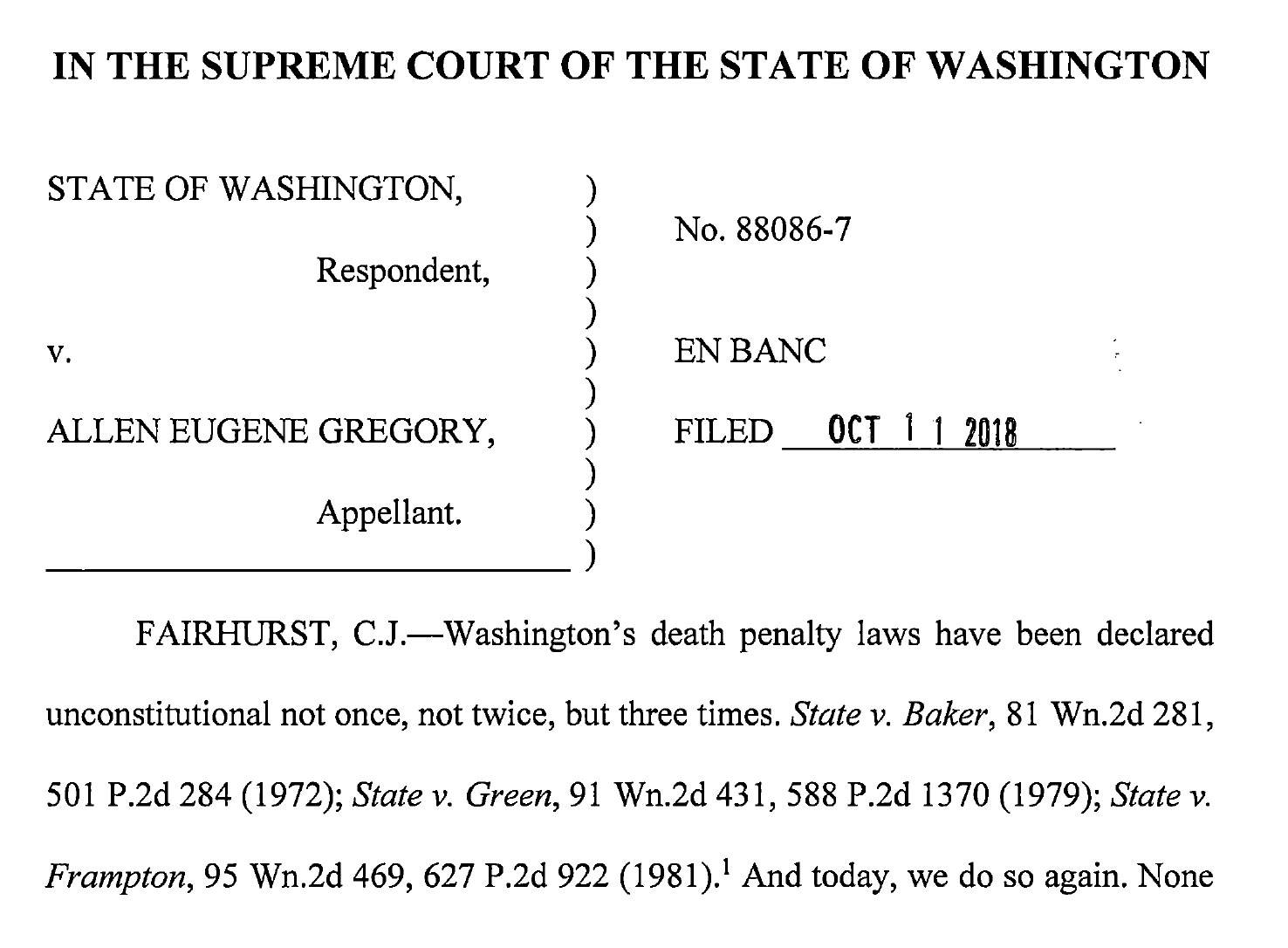The Washington state Supreme Court ruled in a unanimous decision on Oct. 11 that the death penalty is “invalid” and “unconstitutional” due to racial bias in its application — effectively banning capital punishment in the state.
Specifically, all nine justices argued that while the death penalty itself isn’t unconstitutional, its usage is unconstitutional because it is “imposed in an arbitrary and racially biased manner.” They cited an extensive 2014 University of Washington study on racial bias in cases resulting in capital punishment in Washington, noting that from 1981 to 2014, black defendants were between 3.5 and 4.6 times more likely to receive a death sentence than non-black defendants in similar cases. Since 1904, 78 defendants on death row have been executed in Washington.
“Given the evidence before this court and our judicial notice of implicit and overt racial bias against black defendants in this state, we are confident that the association between race and the death penalty is not attributed to random chance,” Chief Justice Mary Fairhurst wrote in the lead opinion. “We hold that Washington’s death penalty is unconstitutional, as administered, because it is imposed in an arbitrary and racially biased manner.”
The ruling stems from the case of Allen Eugene Gregory, a black man who was convicted of raping, robbing, and killing a 43-year-old woman back in 1996. In 2001, he was convicted of first-degree murder and sentenced to death by a jury. However, he and his attorneys appealed the decision, and the case eventually landed before the state Supreme Court.
In their ruling, the court also converted the death sentences of Gregory and the seven other inmates on death row to life imprisonment without possibility of parole. State Attorney General Bob Ferguson said at a press conference Oct. 11 at the state capitol that since the ruling was within the legal framework of the state constitution, it cannot be appealed to the U.S. Supreme Court.
However, the ruling is not a permanent ban on capital punishment. The justices wrote that the death penalty is not innately unconstitutional, and that the state Legislature could draft a “carefully crafted statute” to reimpose a different version capital punishment — so long as it is a system that won’t offend “constitutional rights.”
In 2014, Gov. Jay Inslee placed a moratorium on capital punishment, sparing the lives of inmates who were sitting on death row. Four years later, during the 2018 legislative session, Inslee, along with Ferguson and King County Prosecuting Attorney Dan Satterberg, supported legislation that would have banned the death penalty statewide. However, while the bill passed the state Senate, it failed to move out of the House and was never enacted into law.
Inslee called the ruling a “hugely important moment in our pursuit for equal and fair application of justice.”
“This is a full and final decision by the state Supreme Court and, absent legislative action, there will be no capital punishment in the state of Washington,” Inslee said at the Oct. 11 press conference. He added that he doesn’t think lawmakers can craft a version of capital punishment that won’t violate the court’s ruling, and said that potential effort to reimpose the death penalty would be a “grand waste of time” and that he would veto it.
Gregory’s attorneys Neil Fox and Lila Silverstein also lauded the decision. “By striking down the 1981 death penalty statute, Washington now joins the overwhelming majority of the world’s democracies in its respect for human life,” Fox wrote in a statement. Silverstein added, “However one feels about the propriety of capital punishment in theory, in practice the death penalty is imposed in an unfair, arbitrary, and racially biased manner. The Supreme Court properly ruled the Washington Constitution does not tolerate such an unfair system.”
American Civil Liberties Union Deputy Legal Director Jeffery Robinson, who also participated in Gregory’s case, said in a statement that the court “showed courage in refusing to allow racism to infect life and death decisions.”
He added: “Let’s hope that courage is contagious.”
Across the country, 20 states have eliminated the death penalty altogether.
Talk to us
Please share your story tips by emailing editor@kentreporter.com.
To share your opinion for publication, submit a letter through our website https://www.kentreporter.com/submit-letter/. Include your name, address and daytime phone number. (We’ll only publish your name and hometown.) Please keep letters to 300 words or less.

